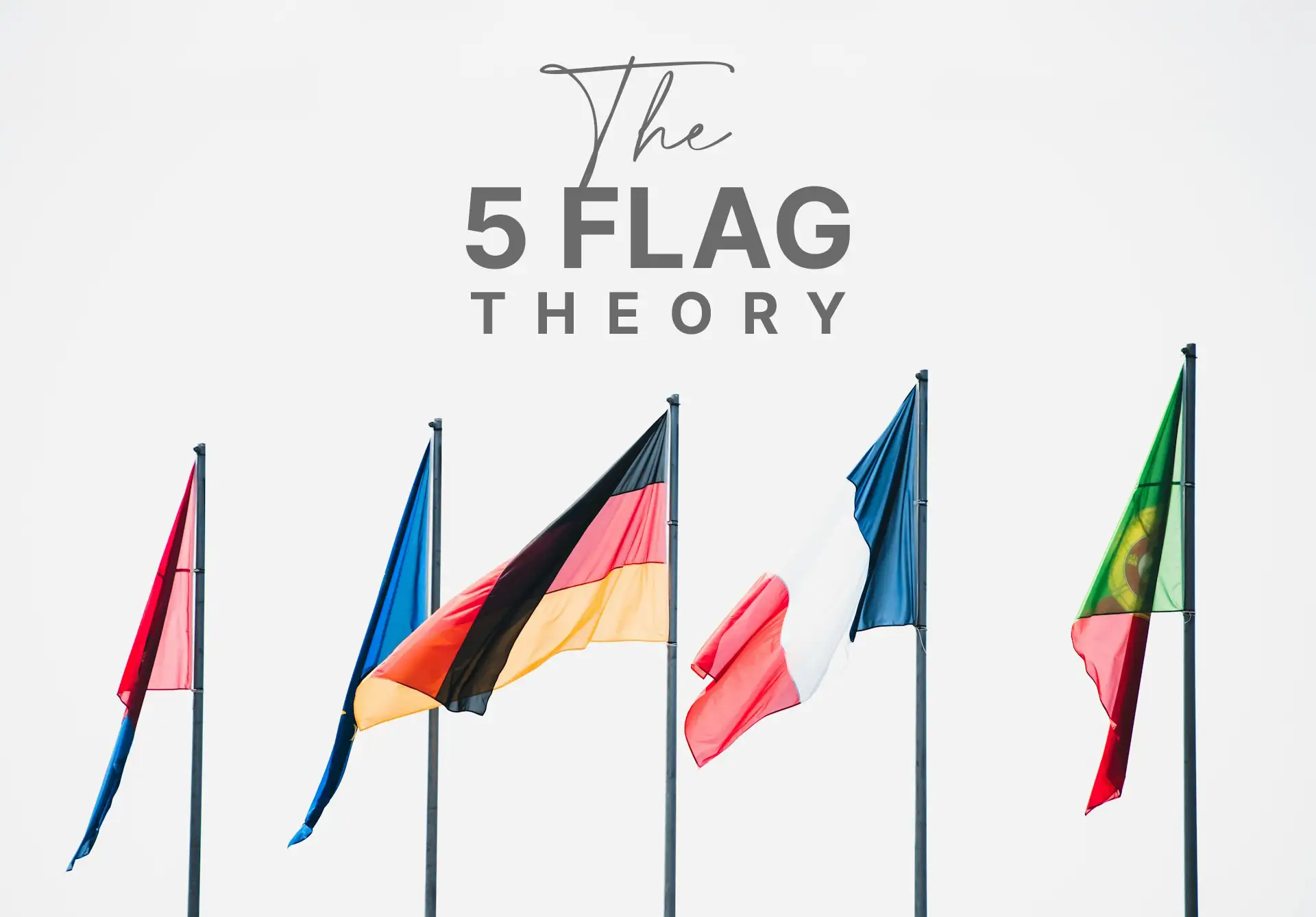For many entrepreneurs, investors, and location-independent professionals, the dream is simple: live where you want, keep more of your earnings, and protect your wealth. One of the most time-tested strategies for achieving this is The Five Flag Theory — a method of structuring your life and finances across multiple countries to reduce taxes, safeguard assets, and increase personal freedom.
Here’s how it works in 2025, and how you can put it into practice.
What is the Five Flag Theory?
The Five Flag Theory evolved from Harry Schultz’s original “Three Flag” concept in the 1980s. While Schultz’s model focused primarily on travel and asset protection, the five-flag version is a more comprehensive approach to global tax planning.
The idea is simple: don’t tie every part of your life to one country. Instead, distribute your citizenship, residency, business, assets, and lifestyle across different jurisdictions — ideally, ones that don’t overlap in a way that triggers high taxes or excessive government control.
By strategically planting these “flags,” you can legally reduce your tax burden, diversify your risk, and create more personal and financial flexibility.

The Five Flags Explained
1. Citizenship
Your first flag is your passport. Ideally, it should come from a country that does not impose citizenship-based taxation.
- For example, most countries tax residents, not citizens. However, the US and Eritrea are exceptions — they tax citizens no matter where they live.
- If your passport is from a citizenship-based taxation country, you may consider obtaining a second citizenship in a tax-friendly jurisdiction.
2. Tax Residency
Your second flag is where you are officially considered a tax resident. This should be a jurisdiction that:
- Is a true tax haven (no income tax), or
- Operates a territorial tax system (only taxes local-source income).
By carefully selecting your residency, you can drastically reduce — or even eliminate — income tax liability.
3. Business Base
The third flag is your business structure. The ideal jurisdiction will:
- Not tax your type of income,
- Have no or low corporate taxes, or
- Operate under territorial rules for business profits.
This could be a US LLC with foreign-sourced income not subject to US tax, or a company incorporated in a low-tax jurisdiction like the UAE.
4. Asset Location
Your fourth flag is where you hold your investments and savings.
- This should be a politically stable, well-regulated country with strong banking laws.
- For example: holding stocks, ETFs, or bonds in Singapore or Switzerland, where gains are not heavily taxed and financial systems are secure.
5. Playground
Your fifth flag is the set of countries where you spend most of your time.
- Choose destinations you enjoy, that offer favorable visa terms, and where you can avoid triggering tax residency.
- Many countries allow stays of up to 3–6 months without tax obligations.

Example in Action
Meet Alex, an Australian entrepreneur:
- Citizenship: Australia (resides abroad, not taxed on foreign income as a non-resident)
- Tax Residency: Dubai (0% income tax)
- Business: Incorporates in Hong Kong to leverage low corporate taxes on international income
- Assets: Holds investments in Singapore for stability and no capital gains tax
- Playground: Splits the year between Thailand, Spain, and South Africa — never staying long enough to be taxed locally
Result: Alex operates globally, pays minimal taxes legally, and enjoys financial security.
The Reality: Perpetual Travel Required
The biggest challenge is movement. A Five Flag lifestyle generally requires avoiding becoming a tax resident anywhere other than your chosen low-tax country.
- While you don’t have to move every week, you may need to limit stays to under 6 months in most countries.
- For some, this constant relocation is part of the adventure; for others, it’s a dealbreaker.
Who Benefits Most?
The Five Flag Theory works best for:
- Online business owners
- Freelancers and remote professionals
- Investors with international portfolios
- Retirees with portable income sources
Even US citizens can adopt parts of this strategy, though citizenship-based taxation makes full tax freedom more complex.

Getting Started
- Test the lifestyle – Spend a year traveling to see if it suits you.
- Plan each flag – Research and select each jurisdiction with care.
- Establish legal structures – Incorporate, set up bank accounts, and arrange residency permits where needed.
- Stay compliant – Track travel days, file required reports, and maintain proper records.
Knowledge and planning are key — each move should be deliberate and legally sound.
Final Thoughts
The Five Flag Theory isn’t just about paying less tax — it’s about designing a life with maximum freedom, privacy, and security. In a world where governments are increasingly hungry for revenue, diversifying your personal and financial “bases” is more valuable than ever.
For those ready to take control of where they live, work, and invest, this strategy can unlock a level of independence that most people never experience.

